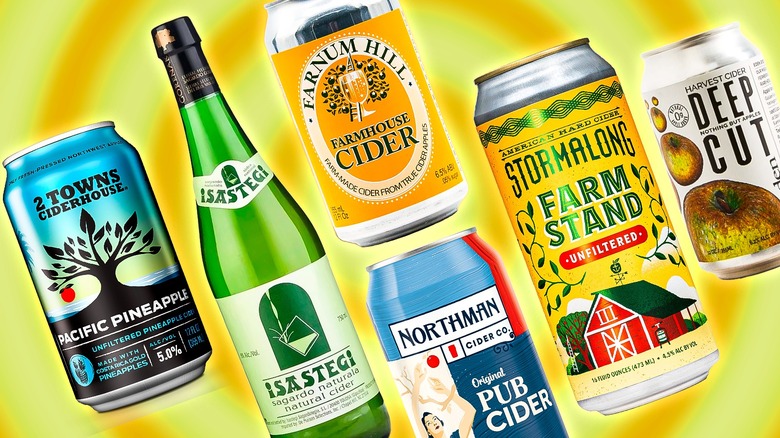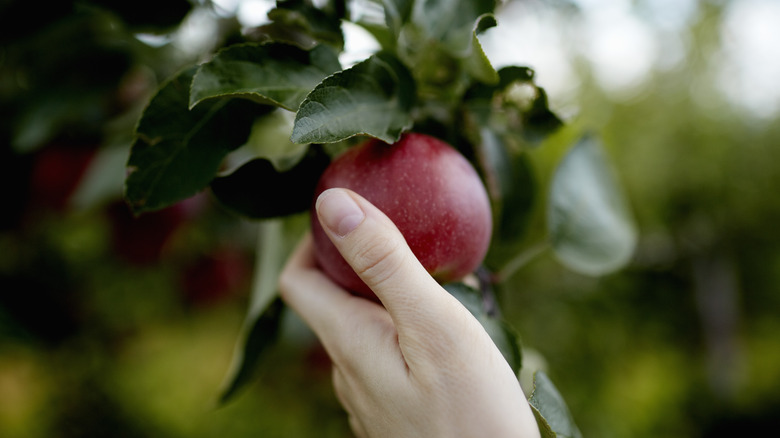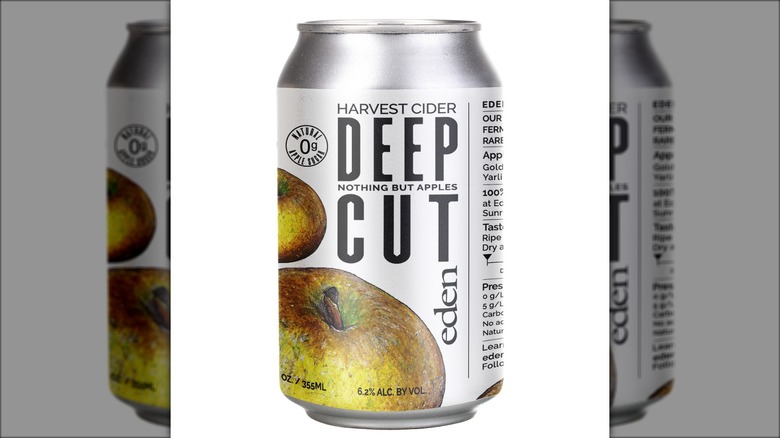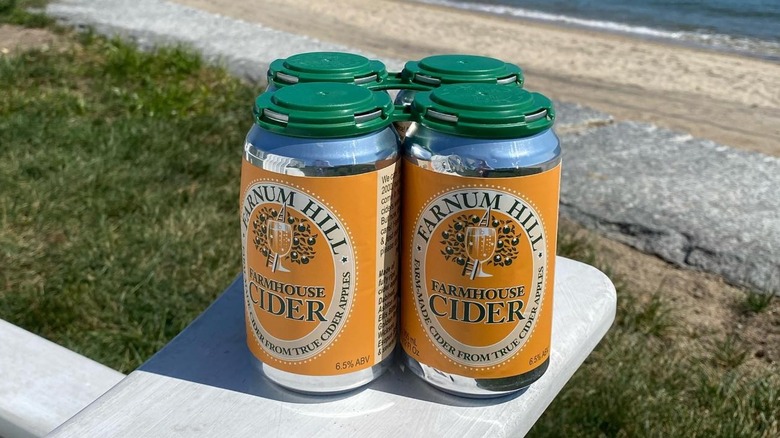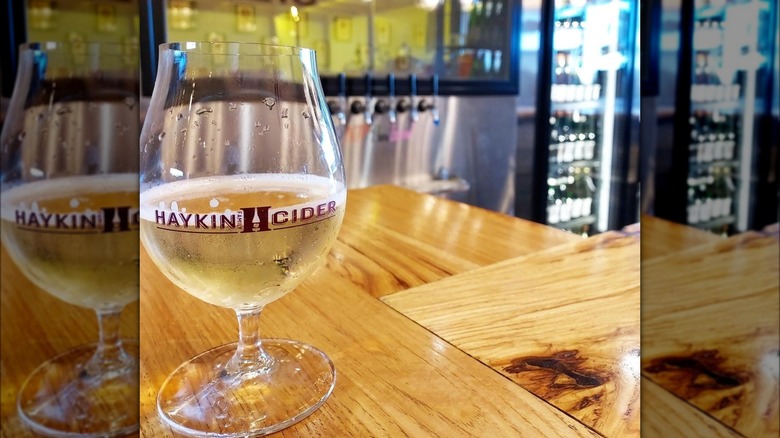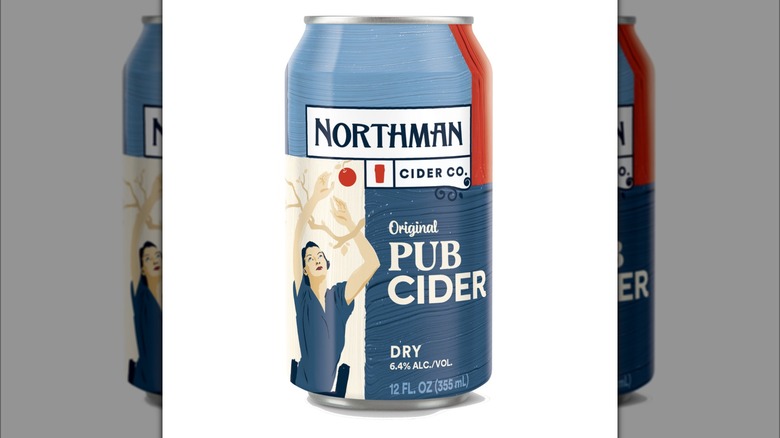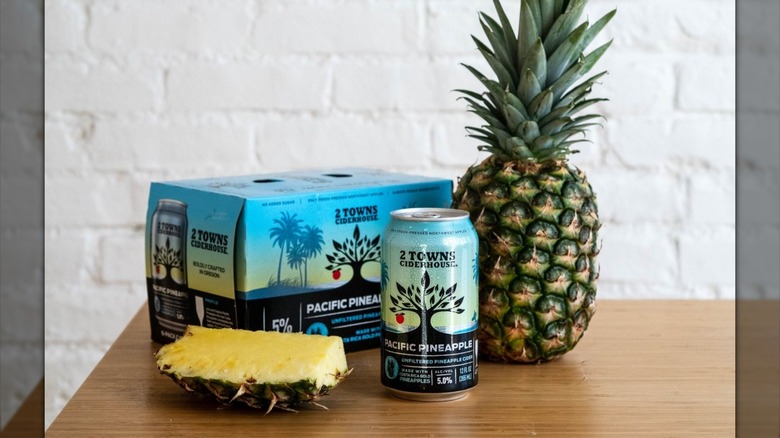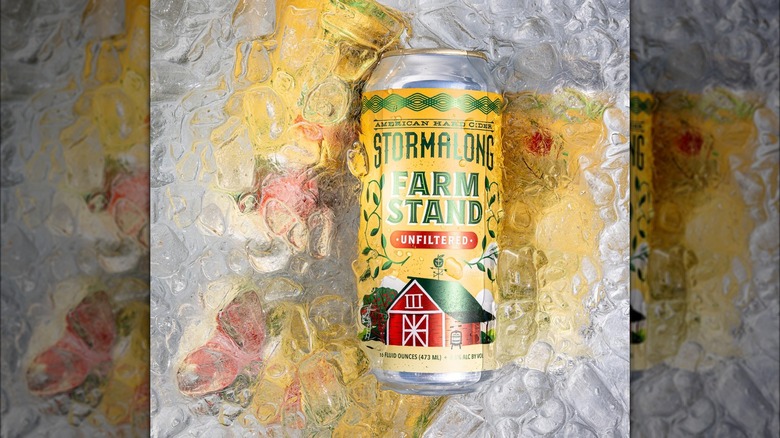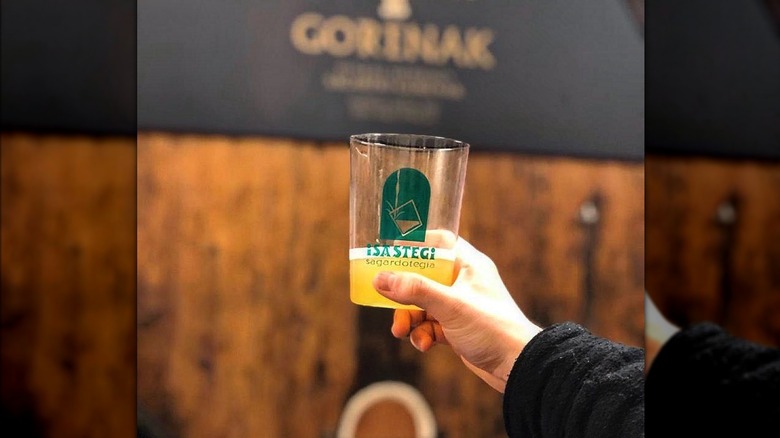The Best Craft Hard Ciders To Drink In 2024, According To Industry Experts
Falling leaves. Cozy sweaters. Apple picking. It's fall, y'all! And with the change in season comes a primal need for fall's favorite beverage. No, we're not talking pumpkin spice lattes. It's time to pour yourself a glass of hard cider.
Apple cider is unfiltered juice from apples, and hard cider is apple cider (or the juice of other fruits) that has fermented into an alcoholic beverage. Similar to winemaking, yeast is allowed to consume the sugars in the fruit juice and convert it into alcohol. This differentiates cider-making from brewing beer, which relies on grains instead of fruit.
Hard cider is made and consumed anywhere apples are grown. In Spain, sidra is a Basque tradition that dates back to the first century. French cidre, alongside poiré (pear cider) and calvados, uses fruit from northwest France. In the United Kingdom, cider dates back to Roman times and the UK is the largest cider market in the world. In the United States, craft hard cider's popularity is on the rise following craft beer and spirits.
It's hard to know where to start when staring at your liquor store's cider selection. We asked two experts — Bryan Wos, general manager of Mr. B's Wine & Spirits at Stanley Marketplace in Aurora, Colorado, and Quinessa Solomon, director of marketing and events at The Northman Beer & Cider Garden in Chicago, Illinois — to share the ciders they're excited to be sipping in 2024. These are the bottles and cans you won't want to miss this fall.
Cider terms to know
Before you start drinking, get familiar with a few must-know cider terms to guide your selection. This cider vocabulary will help you decode labels based on sweetness, amount of effervescence, and even fermentation style.
When it comes to sweetness, the terms to know are dry, off-dry, and semi-sweet. Dry hard cider will have the least amount of sugar and the driest taste. Important to note: Dry ciders will have a higher alcohol content. Why? Because yeast has converted pretty much all the sugar to alcohol. Off-dry cider is a little more sweet, followed by semi-sweet, and sweet is the sweetest. Of course, sweetness isn't the only factor in flavor. Acidity, tannins, and the flavors of the apples or other fruits themselves will all impact the perceived sweetness.
Hard cider can be still, effervescent (or pétillant, with mild bubbles), or sparkling (with lots of bubbles). Bubbles are often achieved using the méthode champenoise that is also used to make many sparkling wines, or using the ancestral method, which allows fermentation to finish in the bottle and captures the carbon dioxide that results from that process. Carbonation can also be injected, which is common in large-scale cideries.
Some cideries will also list the varieties of apples used in their hard cider. A combination of apple varieties helps cidermakers balance sweetness, acidity, and bitterness in their final product. There are hundreds of varieties to choose from, like Chisel Jersey, Harrison, and Northern Spy. Unlike wine, you probably won't choose your hard cider based on apple variety alone — though it's worth a look at the label.
Eden Specialty Ciders Deep Cut Harvest Cider
Bryan Wos of Mr. B's Wine & Spirits thinks the Deep Cut Harvest Cider from Eden Specialty Ciders might be one of the best American-made ciders available. "This cider has the perfect balance of acidity, tannin, and refreshing drinkability," Wos explains.
Eden Specialty Ciders has been making cider in Vermont since 2007 and works with over 50 heirloom apple varieties that it grows and sources from local orchards. Deep Cut is one of its canned Harvest ciders, produced once a year with peak fruit. Eden Specialty Ciders describes this particular cider as bone dry with peach and tropical fruit notes alongside the astringent flavor of black tea. It is made using a combination of Golden Russet, Somerset Redstreak, Dabinett, Yarlington Mill, McIntosh, and Empire apples.
Purchase Eden Specialty Ciders Deep Cut starting at $86.00 for 24 12-ounce cans.
Farnum Hill Ciders Farmhouse Cider
If you're looking for a great cider to pair with food, look no further than the Farmhouse Cider from Farnum Hill Ciders in New Hampshire. Poverty Lane Orchards has been growing apples since the 1970s, and now distributes its ciders by can, bottle, and even bag.
Quinessa Solomon of The Northman in Chicago describes the Farmhouse Cider as "dry and bubbly with bitter sweet apple flavors, and a slight hint of pineapple," and notes that there's an earthiness that makes it excellent with food. It's an approachable cider with a barnyard funk like you'd find in a farmhouse ale or saison-style beer. According to Farnum Hill Ciders, this cider is less complex than some of its other products and features a selection of different cider apples.
Purchase Farmhouse Cider from Farnum Hill Ciders starting at $24.00 for six 12-ounce cans.
Haykin Family Cider Newtown Pippin
Craft hard cider is a world away from the super-sweet stuff you might find at your local sports bar, and that's thanks to care for the apples and the cider-making process. Haykin Family Cider in Aurora, Colorado is no different, and it's one of Bryan Wos's favorites. "Dan and his wife Talia have been producing award-winning cider for a number of years, and the attention to detail and care for what they do shows in their product," he explains.
Most of Haykin's ciders are single varietals, using just one type of apple to highlight distinct flavor profiles. They're also vintaged, another nod to winemaking that shows Haykin Family Cider's care and passion for its product.
Newtown Pippin, sourced from Washington, is Wos's preferred bottle — and was also one of Thomas Jefferson's favorite apples. "This bottling is zesty, dry, and reminds me of the characteristics of sparkling wine and champagne [that] can be found in cider," Wos says.
Purchase Newtown Pippin from Haykin Family Ciders starting at $14.00 for a 375-milliliter bottle.
Northman Cider Co. Original Pub Cider
Who better to make delicious canned cider than the owners of a cider-centric pub? Northman Cider Company's Pub Cider was originally brewed as a welcome drink for pub guests, meant to help introduce them to the world of cider. It eventually evolved into a drink that's available both on tap at The Northman and in cans at Chicago-area retailers.
Using a blend of Michigan apples, the cider is acidic and dry with aromas of "apricot, white plums, red apple skin, and a cidery floor during harvest." Says Quinessa Solomon: "This is the perfect cider for a session with friends, or a night at the pub." That dryness lets the apple flavors shine and makes the cider easier to pair with foods than a sweeter variety might be.
2 Towns Ciderhouse Pacific Pineapple
When you think of hard cider, you probably think of apples, but that's not the only fruit in the cider game. 2 Towns Ciderhouse in Oregon turns to all sorts of fruits — think cherry, raspberry, and peach as well as prickly pear, passion fruit, and hibiscus — to round out its offerings. Bryan Wos's favorite is Pacific Pineapple, which combines Costa Rican pineapples with apples from the Pacific Northwest.
"Pacific Pineapple is a very fresh, fun, food-friendly cider," Wos describes. It is off-dry, retaining a bit of pineapple's sweetness without being too cloying. To Wos, it's a great introduction to craft cider, walking the line between approachable and creative. It's also low in alcohol (only 5% ABV), making it extra easy to drink.
Purchase Pacific Pineapple from 2 Towns Ciderhouse starting at $13.09 for six 12-ounce cans.
Stormalong Cider Farmstand Unfiltered
Located in Sherborn, Massachusetts, Stormalong Cider uses heirloom apples to produce ciders that are a big hit at The Northman. The Farmstand Unfiltered is a hard cider must for fall, reminiscent of that cloudy, fresh cider that makes New Englanders (this writer, included) nostalgic for childhood days picking McIntosh apples. Quinessa Solomon says this one's enjoyable all year round, but it's at its best when the leaves start to change.
Stormalong describes the Farmstand Unfiltered as "tangy, juicy, and refreshing." It's a blend of apples you may have seen at the grocery store — especially if you're from the Northeast — including McIntosh, Honeycrisp, Gala, Empire, Cortland, and Macoun.
Purchase Farmstand Unfiltered from Stormalong Cider starting at $12.99 for four 16-ounce cans.
Isastegi Sagardo Naturala
If you're ready to take your cider-drinking to the next level, turn to one of the world's iconic cider regions: Basque Country in northern Spain, on the western edge of the border between Spain and France. Isastegi is a family farm that has been producing hard cider, or sagardo, since the 17th century using ancestral methods. The native Basque apples are locally grown, fermented in stainless steel, and then blended in kupelas — big, old oak cider barrels.
"This all-natural, dry cider is unlike most French and American offerings we are familiar with," says Bryan Wos. "It has a distinct minerality to the palate, and is recommended to be poured into a wide glass at arm's length to promote a creamy, effervescent mousse." That minerality is thanks to the orchards' location overlooking the Bay of Biscay. To really see the difference in ciders around the world, invite your friends and host a cider tasting — you can thank us later.
Purchase Isastegi Sagardo Naturala from Press Then Press Cider Shop starting at $14.00 for a 750-milliliter bottle.
